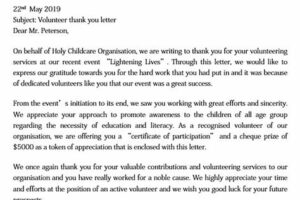Table of Contents
Many people wonder if volunteer work can be considered as professional experience. This article explores the value of volunteer work in enhancing skills, gaining practical knowledge, and demonstrating commitment to a cause. It discusses how volunteering can bridge the gap in employment history, showcase transferable skills, and boost a resume. Read on to understand how volunteer work can be a valuable addition to your professional journey.
Volunteer work is often seen as an opportunity to give back to the community and make a positive impact on the lives of others. However, what many people fail to realize is that volunteer work can also serve as a valuable source of professional experience.
Not only does volunteering demonstrate your dedication and commitment to social causes, but it also allows you to develop a wide range of skills that are highly sought after in the professional world.
From communication and teamwork to problem-solving and leadership, the experiences gained through volunteer work can be just as valuable as those obtained in a traditional job setting.
So, if you’ve ever questioned whether your time spent volunteering is worth mentioning on your resume or during a job interview, the answer is a resounding yes.
Introduction
Volunteering is a noble act that involves individuals dedicating their time and skills to help others in need. While volunteer work is primarily associated with contributing to society, many people wonder if it can also be considered professional experience. In this article, we will explore the value of volunteer work and whether it holds significance in a professional context.
Understanding Volunteer Work
Volunteer work refers to unpaid activities undertaken by individuals or groups to support various causes or organizations. It can involve anything from assisting at a local soup kitchen to working on community development projects. The motivation behind volunteering often stems from a desire to make a positive impact and give back to the community.
The Skills Acquired Through Volunteer Work
Engaging in volunteer work provides individuals with an opportunity to develop a wide range of valuable skills. These skills can include communication, teamwork, problem-solving, leadership, time management, and adaptability. Additionally, volunteers often gain experience in specific areas directly related to the cause they are supporting, such as event planning, fundraising, or teaching.
Showcasing Transferable Skills
While volunteer work may not be directly aligned with a specific profession, it allows individuals to acquire transferable skills that are highly sought after in the workplace. Many of the skills developed through volunteering, such as communication and teamwork, are universally applicable and can be utilized across different industries and job roles.
Highlighting Commitment and Dedication
Participating in volunteer work demonstrates an individual’s commitment and dedication to a cause or organization. Employers value these qualities as they indicate a strong work ethic and a willingness to go above and beyond for the betterment of others. By showcasing volunteer experience on a resume or during an interview, individuals can provide evidence of their dedication and passion.
Networking Opportunities
Volunteer work often provides individuals with the chance to connect with professionals from various fields. These networking opportunities can be invaluable when seeking future employment or career advancement. Building relationships with individuals who share similar interests and values can lead to mentorship, job referrals, and even long-lasting professional connections.
Volunteer Work in a Professional Context
While volunteer work may not be classified as traditional professional experience, it is still highly regarded by many employers. Hiring managers often appreciate candidates who have demonstrated a commitment to their community and possess a diverse skill set. Volunteer work can help individuals stand out among other applicants and showcase their character and values.
Emphasizing Relevant Volunteer Experience
When including volunteer work on a resume or discussing it in an interview, it is essential to emphasize the relevance of the experience to the desired position. This can be achieved by highlighting specific skills gained or projects undertaken during volunteer work that align with the requirements of the job. By making these connections explicit, individuals can effectively demonstrate the value of their volunteer experience in a professional context.
Volunteer Work and Career Changes
For individuals looking to make a career change, volunteer work can be particularly beneficial. It allows them to gain relevant experience, build new skills, and establish connections in their desired field. Volunteering can act as a bridge between their current profession and the one they aspire to pursue, providing valuable exposure and knowledge.
The Impact of Volunteer Work
Ultimately, whether volunteer work counts as professional experience or not, its impact on both individuals and society cannot be denied. Engaging in such activities not only helps those in need but also fosters personal growth and development. The intangible benefits gained from volunteer work, such as empathy, compassion, and a sense of fulfillment, can positively influence individuals’ personal and professional lives.
Conclusion
Volunteer work may not fit the traditional definition of professional experience, but it undoubtedly holds immense value and significance in a professional context. The skills acquired, dedication demonstrated, and connections made through volunteer work can greatly contribute to an individual’s overall professional development. As society recognizes the importance of giving back, employers too are increasingly appreciating the unique qualities that volunteer work brings to the table.
Introduction: Understanding the Value of Volunteer Work for Professional Experience
Volunteer work is often overlooked in terms of its value as professional experience. However, it can offer valuable opportunities for skills development, networking, and demonstrating commitment and dedication. In this article, we will explore the question of whether volunteer work should be considered as professional experience and its potential impact on future career opportunities.
Volunteer Work and Skills Development: Enhancing Your Skill Set
Engaging in volunteer work allows individuals to acquire and develop various skills that are transferable to professional settings. Whether it’s honing communication, leadership, problem-solving, or project management skills, volunteering can provide a practical learning environment, contributing to professional growth. By actively participating in volunteer activities, individuals can gain hands-on experience and learn how to navigate challenges, collaborate with others, and achieve goals.
Networking Opportunities: Building Connections and Expanding Your Network
Volunteering can connect individuals with like-minded professionals and provide networking opportunities that can potentially lead to valuable contacts or job offers. Engaging with individuals from diverse backgrounds and industries can broaden professional horizons and open doors to new career paths. Through volunteer work, individuals can meet influential people in their field of interest, attend industry events, and build relationships that could prove beneficial in their professional journey.
Demonstrating Commitment and Dedication: Impressing Potential Employers
Volunteer work showcases an individual’s commitment, dedication, and passion for a cause or organization. This level of commitment can impress potential employers, highlighting personal values and a proactive attitude towards making a difference, which can set candidates apart during the hiring process. Employers often seek candidates who not only possess the necessary skills but also demonstrate a strong work ethic and a sense of purpose. By showcasing volunteer work, individuals can demonstrate their dedication and commitment to personal and professional growth.
Highlighting Transferable Skills: Tailoring Your Volunteer Experience
Effectively communicating your volunteer experience on your resume or during job interviews can help highlight relevant transferable skills that align with the desired position. By tailoring your volunteer work to demonstrate its direct relevance to the job you’re applying for, you can effectively position yourself as a qualified candidate. For example, if you have volunteered as a team leader for a community project, you can highlight your leadership, communication, and problem-solving skills, which are valuable in managerial roles. Emphasizing these transferable skills gained through volunteer work can enhance your professional image and increase your chances of securing employment.
Gaining Real-World Experience: Bridging the Gap
For individuals lacking professional experience, volunteering can provide a bridge to the labor market by offering practical, real-world exposure. Volunteering can serve as a stepping stone, allowing individuals to gain valuable experience and enhance their employability in their desired field. By actively participating in volunteer roles, individuals can gain insights into industry practices, acquire industry-specific knowledge, and develop the confidence needed to transition into paid employment. This real-world experience gained through volunteer work can help bridge the gap between education and the workforce.
Making a Social Impact: Enhancing Professional Reputation
Engaging in meaningful volunteer work allows individuals to contribute to important causes and make a positive social impact. This can enhance their professional reputation, demonstrating a commitment to social responsibility and ethics, which can attract potential employers, partners, or clients who share similar values. Employers often value candidates who not only possess the necessary skills but also show a genuine concern for social issues. By engaging in volunteer work, individuals can strengthen their professional reputation and differentiate themselves from other candidates.
Leveraging Volunteer Roles: Emphasizing Responsibilities and Achievements
Volunteering often involves taking on responsibilities and achieving noteworthy accomplishments. By strategically highlighting these roles and achievements on your resume or during interviews, you can leverage your volunteer work to demonstrate your capacity for leadership, teamwork, and successful outcomes, enhancing your professional image. For instance, if you have organized fundraising events for a non-profit organization, you can showcase your project management skills, ability to work under pressure, and success in meeting fundraising targets. This allows potential employers to see your potential and value as a candidate.
Conclusion
In conclusion, volunteer work should indeed be considered as professional experience due to the opportunities it presents for skills development, networking, demonstrating commitment, and bridging the gap towards gaining real-world experience. By effectively framing and leveraging your volunteer work, you can enhance your professional prospects and open doors to new opportunities in your career. Volunteering not only allows individuals to contribute to important causes but also provides a platform for personal and professional growth. Therefore, it is essential to recognize the value of volunteer work and its potential impact on future career success.
Volunteer work can indeed be considered as professional experience, as it provides individuals with valuable skills and attributes that are transferable to the workplace. While volunteer work may not always be directly related to one’s chosen profession, it offers numerous benefits that can enhance a person’s professional growth and development.
Here are several reasons why volunteer work should be recognized as professional experience:
- Development of transferable skills: Volunteer work allows individuals to acquire and hone a wide range of skills that are highly sought after in the professional world. These skills include communication, teamwork, problem-solving, leadership, time management, and organizational abilities. Such abilities are applicable across various industries and can greatly contribute to one’s success in a professional setting.
- Exposure to diverse environments: Volunteering often exposes individuals to diverse environments and populations, enabling them to develop cultural awareness, adaptability, and empathy. These experiences can be invaluable in professional settings, where individuals frequently interact with people from different backgrounds and perspectives.
- Expanded professional network: Volunteer work allows individuals to expand their professional network by connecting with like-minded individuals, community leaders, and professionals in various fields. Building and nurturing these relationships can provide opportunities for mentorship, job referrals, and professional growth.
- Demonstration of initiative and commitment: Engaging in volunteer work showcases an individual’s initiative, passion, and commitment towards a cause or organization. Employers often value these qualities in candidates, as they demonstrate a proactive attitude and a willingness to go above and beyond to make a positive impact.
- Relevant experience in specific fields: In some cases, volunteer work can directly align with one’s desired profession. For example, volunteering at a hospital or nonprofit organization can provide valuable experience for individuals pursuing careers in healthcare or social work. This hands-on experience can enhance their understanding of the field and make them more competitive candidates for future employment opportunities.
In conclusion, volunteer work should be recognized as valuable professional experience. The skills, experiences, and connections gained through volunteering can contribute significantly to one’s professional growth, making them a more well-rounded and desirable candidate in the job market.
Thank you for taking the time to visit our blog and read our article on whether volunteer work counts as professional experience. We hope that this piece has provided you with valuable insights and a better understanding of the topic. While we encourage you to form your own opinions, we believe that volunteer work can indeed be considered as professional experience.
Firstly, it is important to note that volunteer work offers individuals the opportunity to acquire and develop various skills that are highly valued in the professional world. Whether it is through organizing events, managing teams, or working on specific projects, volunteers often gain transferable skills such as leadership, problem-solving, communication, and teamwork. These are qualities that employers look for in potential candidates, and having them on your resume can greatly enhance your chances of securing a job.
Moreover, volunteer work allows individuals to gain practical experience in their field of interest. For example, if you are passionate about environmental conservation, volunteering at an organization dedicated to this cause can provide you with hands-on experience in areas such as research, data analysis, or community outreach. This type of experience not only demonstrates your commitment to your chosen field but also helps you build a network of contacts who may be able to provide references or open doors to future employment opportunities.
In addition to the skills and experience gained, volunteer work also showcases personal qualities and values that are highly regarded by employers. Volunteering often requires individuals to be self-motivated, adaptable, and passionate about making a difference. These qualities can be difficult to demonstrate solely through traditional work experience, making volunteer work an excellent way to stand out from other candidates during the hiring process.
In conclusion, volunteer work should unquestionably be considered as professional experience. The skills, experiences, and personal qualities gained through volunteering can be just as valuable, if not more so, than those obtained through paid employment. So, if you have engaged in volunteer work, be sure to highlight it on your resume and during job interviews. Emphasize the skills acquired, the experiences gained, and the personal growth achieved through your volunteer endeavors. Remember, the value of volunteer work extends far beyond the act itself, and it can truly make a difference in your professional journey.
Thank you once again for visiting our blog, and we hope that you found this article informative and inspiring. If you have any further questions or would like to share your own experiences with volunteer work, please feel free to leave a comment below. We appreciate your engagement and look forward to continuing the conversation.
.Does Volunteer Work Count As Professional Experience?
People also ask:
- Is volunteer work considered professional experience?
- Should I include volunteer work on my resume?
- How do I list volunteer work on my resume?
- Can volunteer work substitute professional experience?
- How can I leverage my volunteer work during a job interview?
Volunteer work can be considered as professional experience, depending on the nature of the work and its relevance to the position you are applying for. While it may not be directly related to your field or industry, it can still showcase valuable transferable skills and demonstrate your commitment, dedication, and willingness to contribute to a cause or organization.
Yes, including volunteer work on your resume is generally recommended. It allows you to highlight additional experiences and skills that may not be reflected in your paid work history. Employers often value volunteer work as it shows your well-roundedness, compassion, and community involvement.
When listing volunteer work on your resume, consider creating a separate section dedicated to Volunteer Experience. Include the name of the organization, your role or position, dates of involvement, and a brief description of your responsibilities and accomplishments. You can also mention any relevant skills or achievements gained through your volunteer work.
In some cases, volunteer work can serve as a substitute for professional experience, particularly if you have limited or no paid work history in a specific field. However, it is important to showcase the skills and knowledge gained through your volunteer work and how they relate to the position you are applying for. Combining volunteer experience with any relevant education or certifications can strengthen your overall qualifications.
During a job interview, you can leverage your volunteer work by emphasizing the skills, experiences, and personal qualities you developed through your volunteering efforts. Discuss how these attributes align with the requirements of the job and how they make you a well-rounded candidate. Use specific examples of challenges you faced, accomplishments you achieved, and lessons you learned during your volunteer work.
Overall, volunteer work can indeed count as professional experience and can significantly enhance your resume, showcasing your diverse skill set and dedication to making a positive impact. It is important to present your volunteer work in a clear and concise manner, highlighting its relevance to the desired position and the valuable qualities it has helped you develop.






